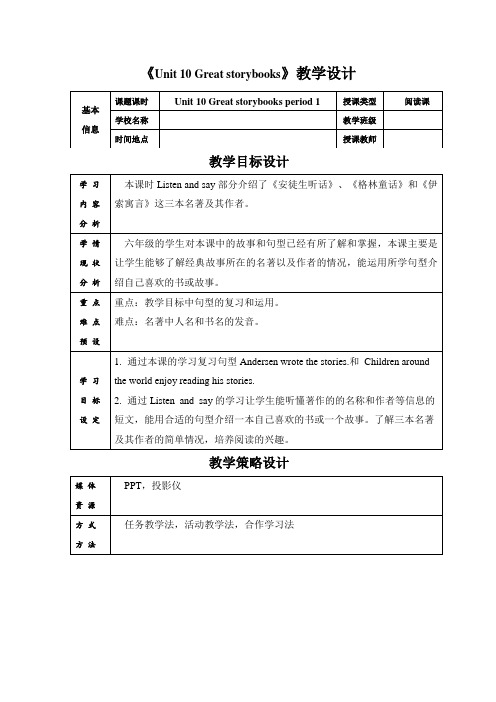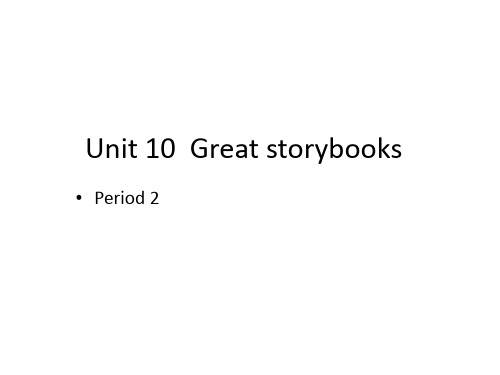最新牛津上海版深圳英语六年级下册module 4 unit 10《great storybooks》教案2.doc
小学英语牛津上海版六年级下册《Module 4 Unit 10 Great storybook》教案

《Unit 10 Great storybooks》教学设计教学目标设计教学策略设计学习评价设计【主要内容】1. Check students ‘homework: read the name of the books and match the stories with the books.【评价反馈】小组评价【主要内容】1. Read and answer. The teacher asks students to read paragraph 1 and 2, and then answer the questions.2. Read and retell. Ask students to find the key words in Para 3 and 4, and then retell the test with your own words.3. Do a survey. Ask students to do a survey about the classmate’s favorite story and make a report.【评价反馈】1.教师评价2.学生评价【主要内容】1. Find some Chinese classical books and share to our classmate.2. Make a reading card about your favorite Chinese stories.【评价反馈】1.组长评价2.教师评价教学过程设计【激趣导入】 1.The teacher shows some pictures about students reading books in ourschool.2. Ask the question “What is he thinking about?” “Do you like reading?”“What kind of books does you like reading?”【设计意图】1.通过图片引出本课主题。
小学六年级英语下册(牛津上海版深圳用)Module 4 Unit 10 Great storybooks Period 3课件

Think and say What do you know abouts
?
?
Think and say Who wrote these great stories?
The emperor’s
new clothes
Andersen
Snow White
The Grimm brothers
Read aloud
Do you like skiing? Yes, I do. Do you like swimming? No, I don’t. What fruit do you like? I like papayas. When’s Teachers’ Day? It’s on 10th September.
Story: Writer: The story is about ...
Story: Snow White
Writer: The Grimm brothers
The story is about a beautiful princess. It tells us to be kind to others and love can be very powerful.
Read aloud
1 Are those books yours? Yes, they are.
2 Did your mum do the housework yesterday? No, she didn’t.
3 Where does he live? He lives on Zhongshan Road.
Step 2: Write (in simple words)
Step 3: Share
…’s favourite story is “…” It’s about … … wrote the story.
小学英语六年级下册(牛津上海版深圳)Module 4 Unit 10《Great storybooks》公开课课件

“You’re not,” said Mr Sun. “I’m stronger than you.”
“All right,” said Mr Wind, “See how hard I blow.”
“Oh, yes,” sa”
hard Mr Wind blew ________.
grow Mr Sun made the plants ________.
blow off Mr Wind tried to _______ the man’s clothes. Mr Sun went behind a ________. cloud
Un it 10
Module 4 Things we enjoy
Great storybooks 课件2
Think and say
?
?
Stories
? ?
?
Think and say
Who is he?
Andersen
Think and say
Who are they?
The Grimm brothers
Think and say
Who is he?
Aesop
Think and say
They are …
Andersen
The Grimm brothers
Aesop
Think and say
Think and say
Think and say
“I,” said Mr Wind, “Am stronger than you.”
“Your turn,” said Mr Wind. “I had mine.” “OK,” said Mr Sun. Then he began to shine.
牛津上海版(深圳)英语六年级下册Module 4 Unit 10《Great storybooks》公开课课件

Strength is not everything.
Act out the story
Narrator
Act out the story
Step 1: Form groups of four. Step 2: Prepare.
Байду номын сангаас
Step 3: Act out.
One day, the wind met the sun. He thought he was _________ stronger than the sun. But the sun did not think so.
Answer the questions.
1 Which book is the story from? It is from Aesop’s Fables. 2 Who is stronger, Mr Wind or Mr Sun? Mr Sun is stronger.
3 What do you learn from this story?
cold The man felt ________ and he ________ put on his scarf. laughed Mr Sun ________.
It was Mr Sun’s turn. He began to _________. shine
hot The man felt ______. He _________ took off his clothes and went __________. swimming Mr Sun won. At last, ________
Think and say
Who is he?
Aesop
沪教牛津版(深圳用)六年级下册英语Module 4 Unit 10 Great storybooks Period 2课件

Aesop
Think and say
They are …
Andersen
The Grimm brothers
Aesop
Think and say
What else?
Think and say
What else?
Think and say
What else?
Think and say
“I’m hot,” said the man. “I’ll go swimming.” And he took off his clothes.
“See,” said Mr Sun, “I win, Mr Wind.”
Answer the questions.
1 Which book is the story from? It is from Aesop’s Fables.
Step 1: Form groups of four. Step 2: Prepare. Step 3: Act out.
One day, the wind met the sun. He thought he was __s_tr_o_n_g_e_r_ than the sun. But the sun did not think so.
Think and say
Watch and learn
Think and say
“I,” said Mr Wind, “Am stronger than you.”
“You’re not,” said Mr Sun. “I’m stronger than you.”
“All right,” said Mr Wind, “See how hard I blow.”
牛津上海版(深圳)英语六下Module 4 Unit 10《Great storybooks》课件2

?
Snow White
Think and say
Who wrote these great stories?
The emperor’s new clothes
Snow White
The fox and the grapes
Look and say The emperor’s new clothes
Aesop was a Greek storyteller. He was once a slave. He later became free because of his knowledge and intelligence.
Aesop’s Fables is another great book. Most stories in this book are about animals. The animals in the stories can talk. Some well-known stories are “The fox and the grapes”, “The farmer and the snake” and “The wind and the sun”. We can usually learn something from these stories.
Un it 10
Module 4 Things we enjoy
Great storybooks 课件1
Free talk
What kind of books do you read?
Think and say
The emperor’s
new
clothes
?
Stories
The fox and the
沪教牛津版英语(深圳用)六年级下册Module 4 Unit 10 Great storybooks Period 2课件

3 What do you learn from this story?
Strength is not everything.
Act out the story
Narrator
Act out the story
“I’m hot,” said the man. “I’ll go swimming.” And he took off his clothes.
“See,” said Mr Sun, “I win, Mr Wind.”
Answer the questions.
1 Which book is the story from? It is from Aesop’s Fables.
Think and say
Watch and learn
Think and say
“I,” said Mr Wind, “Am stronger than you.”
“You’re not,” said Mr Sun. “I’m stronger than you.”
“All right,” said Mr Wind, “See how hard I blow.”
He __t_o_o_k_o_f_f_ his clothes and went __sw__im__m_i_n_g_. At last, __M_r__S_u_n_ won.
1 read Student’s Book pages 64 and 65. 2 Retell the story on Student’s Book pages 64
Step 1: Form groups of four. Step 2: Prepare. Step 3: Act out.
牛津上海版英语六年级下册Module 4 Unit 10 Great storybooks课件

More about the Grimm brothers
Jacob was born in 1785 and Wilhelm was born in 1786.
The Grimm brothers were story collectors. They collected and wrote many stories. The stories “Snow White”, “The Frog Prince” and “Sleeping Beauty” are from Grimms’ Fairy Tales.
The stories “Snow White”, “Little Red Riding Hood” and “Cinderella” are from Grimms’ Fairy Tales.
the Grimm brothers
The Grimm brothers were German writers. They collected a lot of stories. Both adults and children like their stories.
Aesop
About the writer
Aesop was a Greek storyteller. He wrote Aesop’s Fables. Most stories in this book are about animals. The animals in the stories can talk. Some wellknown stories are “The fox and the grapes”, “The farmer and the snake” and “The wind and the sun”. We can usually learn something from these stories.
- 1、下载文档前请自行甄别文档内容的完整性,平台不提供额外的编辑、内容补充、找答案等附加服务。
- 2、"仅部分预览"的文档,不可在线预览部分如存在完整性等问题,可反馈申请退款(可完整预览的文档不适用该条件!)。
- 3、如文档侵犯您的权益,请联系客服反馈,我们会尽快为您处理(人工客服工作时间:9:00-18:30)。
Module 4 Things we enjoy
Unit 10 Great storybooks
教案2
教学目标:
(1)知识目标:能够熟练运用Do you remember the story…? He╱She wrote a lot of interesting fairy tales and stories. Children around the world enjoy reading his stories等句子,并且能够听、说、认读写collect ,emperor, remember.
(2)能力目标:能够熟练的运用所学句子,能够掌握询问你还记得什么故事与回答,同时在学句子中学会新单词,学会新的句子运用。
(3)情感目标:理解小故事中包含大道理。
教学重点:
听懂、会说:Do you remember the story…? He╱She wrote a lot of interesting fairy tales and stories. Children around the world enjoy reading his stories等句子,能够听、说、认读写词组collect ,emperor, remember.在问答题目练习中能够及时反应,补充未完成的句子。
将问题清晰回答。
教学难点:
新句子较为难以记忆,句子容易弄混,学生记忆困难。
学生恐难以记住。
教学准备:
ppt课件,教案。
教学设计:
Lead-in.
T同学们有听过什么故事吗?S1….(老师开场提问学生问题,问题贴近学生对学生进行提问。
)
(设计意图:利用同学们所熟悉的东西吸引同学们的注意力,同时引起同学们回答问题的兴趣,为接下来句子的学习增强趣味性。
)
Step1. Presentation
Let’s learn some new phrases
简单的用图文并展的方式首先将新单词引入,教同学识读单词collect ,emperor, remember
(设计意图:直接的语音教学让学生牢记单词发音,为接下来句子的运用打下基础。
)
Let’s learn some new sentences.
将所学句子展示出来(Do you remember the story…?He╱She wrote a lot of interesting fairy tales and stories. Children around the world enjoy reading his stories等),利用图文并茂的方式,让同学们有兴趣,在让老师读一遍,说出中文。
所学句子都用此种方式教给学生,所有句子教过过后,在从头开始教学生自己反复练习跟随老师熟读句子。
(设计意图:直接的句子学习虽较为枯燥,但句子较为长,强化训练有助于帮助学生更加快速的了解句子并且理解句子意思,同时可以训练句子发音。
)
Step2. municate
给同学几分钟的时间让同学们自己与自己的同桌练习对话交流。
用上今天所学句子。
(设计意图:单一的重复容易引起枯燥,让同学们自由发挥能够使得同学能够活学活用,不断的增强学习的能力。
)
Step3. Practice
1.培养学生辨认句子的能力
①游戏的具体操作:我们常常都有陷阱的这个游戏,无论在句子,单词,音标上都有,为什么?其实在我们的生活上也有,就好象现在的脑筋急转弯一样,通过一个或者几个时间把你往一个思维定势上走,可是当突然告诉你结果的时候,你的感情是最强烈的,这个时候你的记忆也是最深刻的,我们的陷阱游戏就
带有这个方面的特点。
②我们最开始也是带读,带读,带读,这个准备和上一个游戏的起飞阶段是一样的,但是起作用却是不一样的。
带读一个重要的作用是让学生产生一个惯性,这个惯性有好也有坏。
当我们完成了这个环节,学生读的越来越快,突然教师用手指着一个句子,可是读的是另一个句子,这个时候,学生的第一反应就是跟着读,那么就错了,这是老师的一个坏坏的笑就显得非常的重要了,增加了趣味性,同时也让学生明白他们错了。
这个时候教师就可以提出这个游戏的要求了:
③T :如果教师指的说的是一样的,那么同学们就和老师一起说,如果老师说的和指的不一样,那么学生就不要说,看哪个组的同学最聪明!
④这样就达到了游戏的目的,学生时刻在害怕说错,同时当错了之后,教师坏坏的笑容,真诚的指正,学生就能非常容易的记住这个句子了,我们的目的就达到了。
⑤注意事项:(1)教师本身对于内容要非常的熟练。
⑥通过奖励机制来完成的游戏,教师一定要有奖励的敏感性,同时教师一定要公正,公平。
2. 学生看图片或根据对话将所空缺的句子或单词补全。
要运用之前所学知识。
(设计意图:学生通过游戏,最大化的利用句型,同时最大化的将同学所学的单词等知识融会在句型之中。
将学习与游戏相结合,极大的激发了同学们的学习兴趣。
)
Step4. Homework
Make a conversation with your friends after class and write down on your notebook.。
